Marcelo Santoro’s prison request after confessing to Cecilia Haddad murder in court
LAWYERS for Marcelo Santoro have made an astonishing request after a Brazilian police chief slammed NSW Police for not helping with their investigation into the murder of Cecilia Haddad.
Crime in Focus
Don't miss out on the headlines from Crime in Focus. Followed categories will be added to My News.
MARCELO Santoro confessed to strangling his ex Cecilia Haddad because he felt “unwanted”, then taunted her family with texts pretending to be her, police said at his first court appearance in Rio yesterday.
Police allege he killed the 38-year-old mining executive after “a campaign of psychological terror” and dumped her body in Sydney’s Lane Cove River.
Haddad’s family gave emotional testimony at the pre-trial hearing, where police detailed the last moments of her life, how he went for a juice immediately after killing her, and how he wrapped her body with a mattress and weighed it down with her own scuba diving weights.
A Brazilian police chief also slammed NSW police for a lack of co-operation in the joint prosecution of Santoro, saying they had received no evidence or any other official documents from Australia apart from an initial report.
Homicide squad police chief Dr Fabio Cardoso said Brazilian authorities had no technical evidence, such as DNA or an autopsy, from Australia that would help their case.
MORE: Santoro’s creepy texts to Haddad’s family
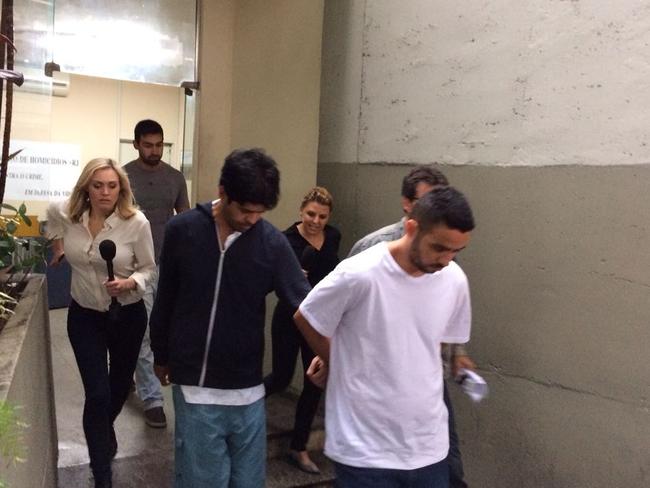
“These things have been solicited, we are waiting for the Australian authorities to send them. They haven’t replied or justified why they haven’t been sent yet,” Dr Cardoso said.
“We have reasserted how important this is, and asked that they send them as quickly as possible. We are still waiting for them to contact us.”
News Corp understands NSW Police have not received formal requests for anything related to the Brazilian prosecution.
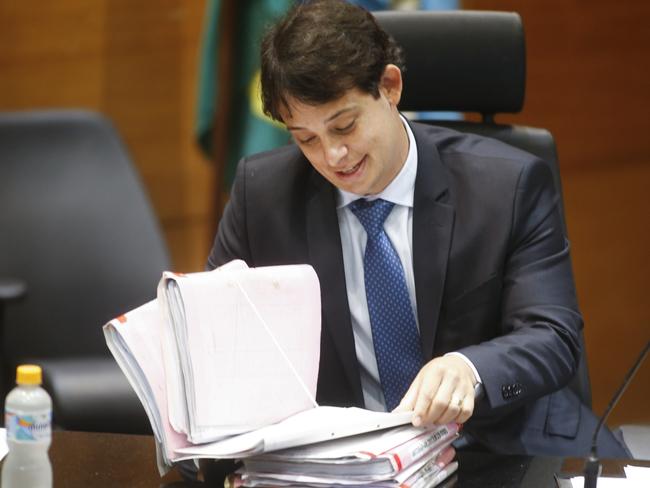
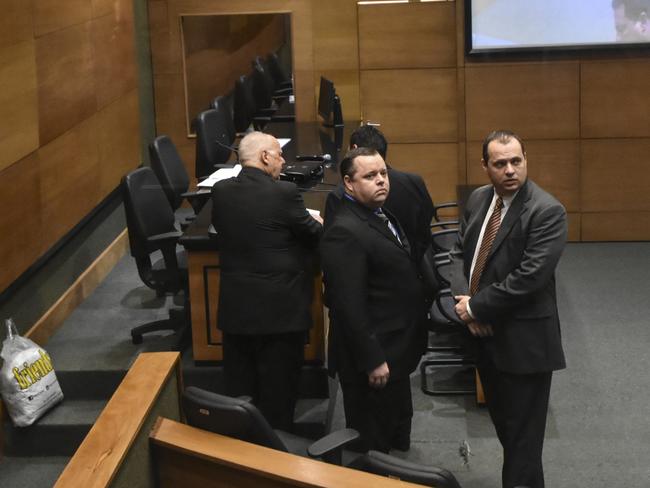
Santoro’s lawyers said outside court they would use the lack of evidence to press for charges to be dropped.
“Everything is based on hearsay. They have received absolutely nothing from the Australian authorities. Everything is based on newspaper reports and one request for co-operation from Interpol,” Dr Eduardo Mair said.
Handcuffed and wearing a cream T-shirt, Santoro looked tired with dark, sunken eyes as he was ushered into the courtroom in Rio’s central criminal court, but managed a smile and a wave after spotting family members in a public gallery.
Santoro listened intently as Dr Cardoso answered questions from prosecutors and Santoro’s team of three lawyers, but was taken away when it was the turn of Ms Haddad’s family to give evidence.


Dr Cardoso said in the days following his arrest, Santoro opened up to officers and during one hour-long informal conversation with a family liaison officer confessed to killing Ms Haddad.
However, after meeting with his lawyers he refused to answer questions or repeat his confession.
Santoro said on April 27, he strangled Ms Haddad in the kitchen of her Sydney apartment, then calmly went to have a juice at a local shopping mall before returning two hours later to deal with her body.
“He was incensed by Cecilia’s growing separation from him,” Dr Cardoso said.
“At the police station, when the subject turned to Cecilia he became altered and would start sobbing.
“When the conversation turned to whether she had another man, he got angry shouting ‘I don’t believe it, I don’t believe it’. He said he had even turned to spiritualism to try to understand why she didn’t want him anymore. He couldn’t accept that she didn’t want him anymore.
“During the four days he was at the police station he never once denied being the author of the crime.”
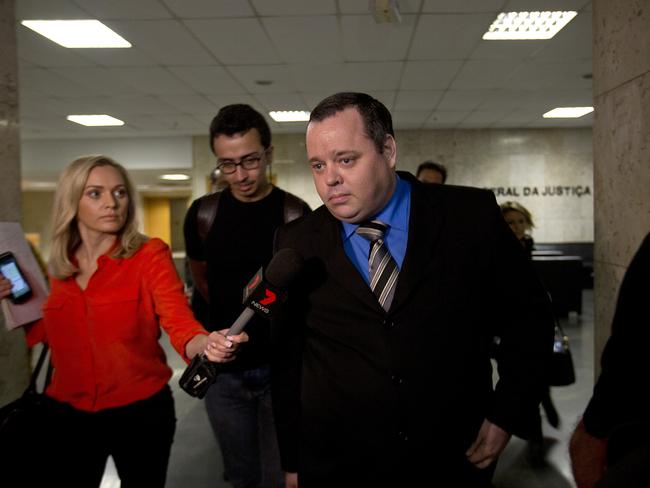
Dr Cardoso said after abandoning her car he took an Uber to Sydney Airport to try to leave the country, but on the way stopped at Sydney’s Gladesville Bridge and threw the keys to Ms Haddad’s car out the window.
The Uber driver told police about the incident, who then conducted a search with divers who found the keys, he said.
Santoro then tried twice to change his plane ticket back to Brazil, but on the first occasion was told there were no more seats on the next flight. However, when he went in person the second time a passenger had cancelled at the last minute.
“Marcelo attributed this last-minute cancellation to God. He believed God had helped him leave the country and avoid being caught by Australian police,” Dr Cardoso said.
In the hours after the murder, Santoro had tried to dupe friends and family into believing Ms Haddad was still alive by pretending to be her.
One WhatsApp message sent from Ms Haddad’s phone to her mother Milu in Brazil read: “My sweet Milu, my WhatsApp isn’t good. I went to the shopping mall to have a massage.”
The message said that she “hadn’t come across Poca” — the nickname Santoro was known by, because of his resemblance to Disney princess Pocahontas — and informed her that she was “going to the mountains.”
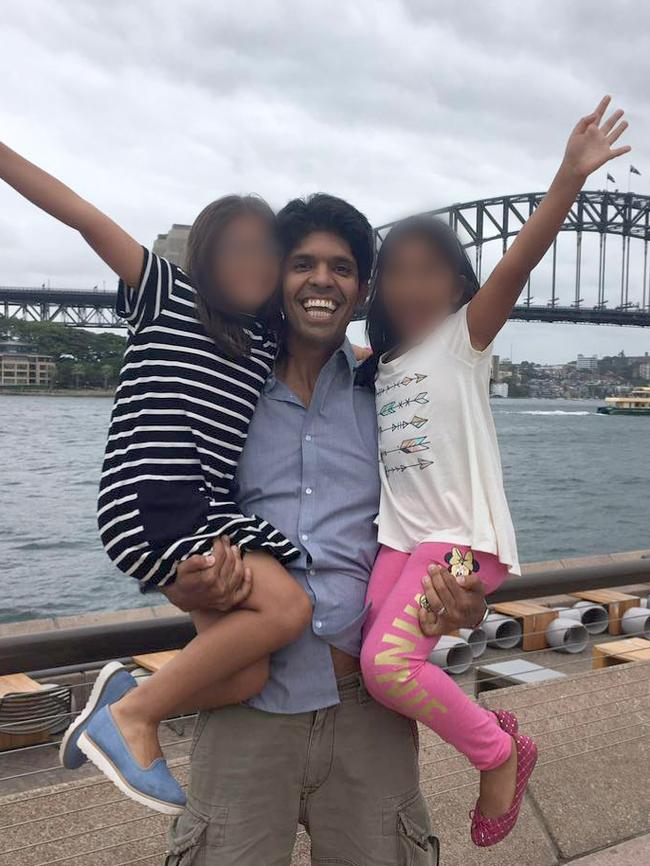
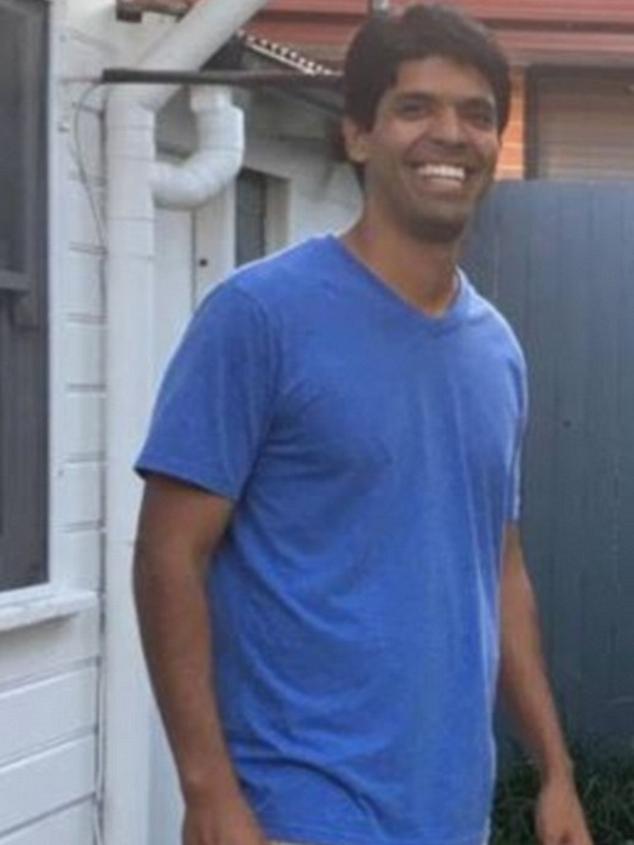
In emotional testimony, Ms Haddad’s father Jose Ibrahim Haddad remembered the last conversation with his daughter, when she asked him to stay on the line as she got home late on the night of April 27, when it is believed she died.
“She didn’t tell me everything that was happening, to protect me. But that night she called me because she was scared. I stayed on the line as she arrived home, then she called Marcelo’s name three times to see if he was there. At the end she said, it’s all right, he isn’t here. It was the last time I spoke with her,” he said.
Ms Haddad’s brother Joao told how his sister, who would communicate with him every day, called one morning telling him that Marcelo had threatened to kill himself if she didn’t accept him back.
“He sent her an email, saying he couldn’t take it anymore and was going to end it. He gave her his bank passcode and asked her to say goodbye to his daughters for him. She left where she was working in Newcastle and drove back to Sydney, but he wasn’t at her home,” he said.
“She later found him and when she asked why he had done it he told her it was just a joke.
“I told her to go to the police. I told her it was serious, that be doing these things he was threatening her. But I think she was scared of him.”
Santoro’s lawyers insinuated Ms Haddad’s ex-husband Felipe had a greater motive for murder than their client, because they were still legally married. The couple had two houses, an apartment, two cars and a boat between them, while Ms Haddad had taken out a multimillion-dollar insurance policy.
They also claimed Santoro had “been beaten up and maltreated” in the prison where he had been held, Patricia Lourival Acioli in the Sao Goncalo area of greater Rio de Janeiro, and that he had recently been treated in the prison hospital after breaking two ribs.
Lawyers claimed he feared for his life and requested his immediate transfer to a better prison because of his university degree — a constitutional right for inmates with higher education in Brazil. Judge Cotta granted the request ordering that Santoro be transferred to the Bangu penitentiary this morning.
